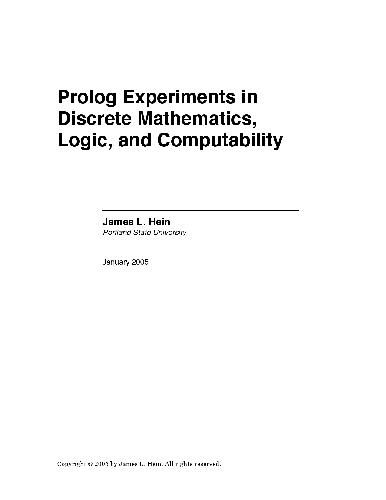
|
FreeComputerBooks.com
Links to Free Computer, Mathematics, Technical Books all over the World
|
|
- Title: Prolog Experiments in Discrete Mathematics, Logic, and Computability
- Author(s) James L. Hein
- Publisher: Portland State University (March, 2009)
- Paperback: N/A
- eBook: PDF, 158 pages
- Language: English
- ISBN-10: N/A
- ISBN-13: N/A
- Share This:

|
This is the accompany book of Discrete Structures, Logic, and Computability, Third Edition, by James L. Hein.
This book contains programming experiments that are designed to reinforce the learning of discrete mathematics, logic, and computability. Most of the experiments are short and to the point, just like traditional homework problems, so that they reflect the daily classroom work.
Thoroughly updated, the new Third Edition of Discrete Structures, Logic, and Computability introduces beginning computer science and computer engineering students to the fundamental techniques and ideas used by computer scientists today, focusing on topics from the fields of mathematics, logic, and computer science itself.
Dr. Hein provides elementary introductions to those ideas and techniques that are necessary to understand and practice the art and science of computing. The text contains all the topics for discrete structures in the reports of the IEEE/ACM Joint Task Force on Computing Curricula for computer science programs and for computer engineering programs.
In traditional experimental laboratories, there are many different tools that are used to perform various experiments. The Prolog programming language is the tool used for the experiments in this book.
About the AuthorsN/A
- Prolog Programming
- Discrete Mathematics
- Mathematical Logic - Set Theory, Model Theory, Computability, etc
- Artificial Intelligence, Machine Learning, and Logic Programming
- LISP Programming Language
- Computer and Programming Languages

- Prolog Experiments in Discrete Mathematics, Logic, and Computability (James L. Hein)
- The Mirror Site (1) - PDF
- The Mirror Site (2) - Read Online
-
 Discrete Mathematics: An Open Introduction (Oscar Levin)
Discrete Mathematics: An Open Introduction (Oscar Levin)
This is a gentle introduction to discrete mathematics. Four main topics are covered: counting, sequences, logic, and graph theory. Along the way proofs are introduced, including proofs by contradiction, proofs by induction, and combinatorial proofs.
-
 Discrete Structures, Logic, and Computability (James L. Hein)
Discrete Structures, Logic, and Computability (James L. Hein)
This book contains programming experiments that are designed to reinforce the learning of discrete mathematics, logic, and computability, provides introductions to those ideas and techniques to understand and practice the art and science of computing.
-
 Mathematical Aspects of Logic Programming Semantics
Mathematical Aspects of Logic Programming Semantics
This book discusses applications of Logic Programming to computational logic and potential applications to the integration of models of computation, knowledge representation and reasoning, and the Semantic Web.
-
 The Power of Prolog (Markus Triska)
The Power of Prolog (Markus Triska)
The goal of this book is to bridge the gap between the great traditional Prolog textbooks of the past and the language as it currently is. It is meant to teach Prolog as a practical programming tool and so it concentrates on using Prolog to solve interesting problems.
-
 Learn Prolog Now! (Patrick Blackburn, et al.)
Learn Prolog Now! (Patrick Blackburn, et al.)
This book has became one of the most popular introductions to the Prolog programming language, an introduction prized for its clarity and down-to-earth approach. The emphasis in this book is on using Prolog effectively.
-
 The Art of Prolog: Advanced Programming Techniques
The Art of Prolog: Advanced Programming Techniques
This book offers a departure from current books that focus on small programming examples requiring additional instruction in order to extend them to full programming projects. It shows how to design and organize moderate to large Prolog programs.
-
 Prolog for Programmers (Feliks Kluznia, et al)
Prolog for Programmers (Feliks Kluznia, et al)
This book is intended as an introduction to Prolog for people familiar with conventional programming languages. It explains in terms of programming constructs and techniques found in Pascal.
-
 Logic, Programming and Prolog, 2nd Edition (Ulf Nilsson, et al)
Logic, Programming and Prolog, 2nd Edition (Ulf Nilsson, et al)
This book introduces major new developments in a continually evolving field and includes such topics as concurrency and equational and constraint logic programming. What sets this book apart from others on logic programming is the breadth of its coverage.
-
 An Introduction to Logic Programming Through Prolog (J. Spivey)
An Introduction to Logic Programming Through Prolog (J. Spivey)
This is one of the few texts that combines three essential theses in the study of logic programming: logic, programming, and implementation. The book contains a concise and self-contained account of the logic behind Prolog programming.
-
 Prolog Programming: A First Course (Paul Brna)
Prolog Programming: A First Course (Paul Brna)
The course for which these notes are designed is intended for undergraduate students who have some programming experience and may even have written a few programs in Prolog. The emphasis in this book is on using Prolog effectively.
-
 Prolog Programming in Depth (Michael A. Covington)
Prolog Programming in Depth (Michael A. Covington)
This book covers the Prolog programming language thoroughly with an emphasis on building practical application software, not just theory. Readers build several types of expert systems, as well as natural language processing software and utilities.
-
 Expert Systems in Prolog (Dennis Merritt)
Expert Systems in Prolog (Dennis Merritt)
For Prolog programmer interested in either building expert systems or experimenting with various expert system techniques. using a step-by-step approach to building systems, explaining the concepts and showing the Prolog code at each stage.





